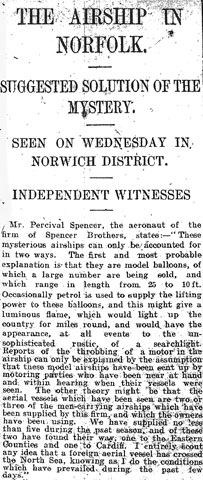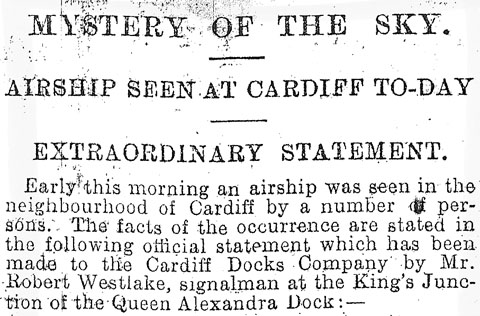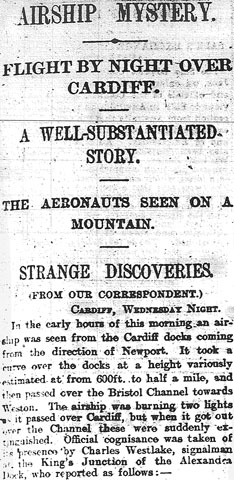This week’s issue of Flight carries a short piece about ‘Phantom airships and scare headlines’ (p. 318). It’s scornful of the credulity of ‘a certain section of the Press’, since ‘it was evident from the very first that either a practical joke was being played or that a bold advertising scheme was on foot’.
The lengths to which speculation of the wildest kind were allowed to go was neither beneficial to the new industry [i.e. aviation] nor calculated to enhance the dignity of the British public in the eyes of foreign nations.
Usefully, Flight reveals the name of the company which operated the Dunstable airship, now generally assumed to have been the cause of the airship scare. For some reason the other newspapers I’ve looked at are silent on this point (perhaps they object to giving free publicity). According to Mr C. D. Clayton:
The airship which has been causing considerable comment by its mysterious passages turns out to be Sizaire Mors airship of Messrs. Jarrott and Letts, Ltd., and which was found wrecked on Chalk Hill Down, Dunstable, in the early morning of May 25th, being discovered by L. White, who has been rewarded with the sum of £5.
Jarrott and Letts were a fairly well-known and long-lived motor firm which sold Crossleys and Lorraine-Dietrichs. Later they sold Bugattis too. The reference to ‘Sizaire Mors’ suggests some connection to the French Sizaire-Naudin car manufacturer, but what exactly that might be, I don’t know. Flight doesn’t explain who C. D. Clayton is, but in 1910 he is to be found organising a Spencer airship flight over London to promote a new acetylene generator (!) So he’s probably the creative genius behind this whole affair.

After its sterling effort last week, the Norfolk News only has one reference to scareships today. It comes from a speech by the Mayor of Norwich, Walter Rye, to the Norwich Miniature Rifle Club on Tuesday night (p. 7). (What is it with miniature rifles?) At the tail end of a long speech on the virtues of miniature rifle shooting, the evolution of firepower, and playing with toy soldiers, the Mayor turned to current events:
Referring to the airship topic, his Worship said it was ridiculous for the Germans to suppose the English nation to be in any way scared. Englishmen were simply interested in the matter. What it would all result in he could not say. Perhaps this mysterious airship would ultimately turn out to be a big piece of advertisement. (Laughter.) To say that we were afraid of the Germans was simply rubbish. A year ago there was far more discussion in the newspapers over the mysterious owl than had occurred through the mysterious airship. (Loud laughter.) The only point was whether they did not come within the same category. (More laughter.) However, the mystery remained to be solved.
The ‘mysterious owl’ must be a reference to the luminous owls which were seen in Norfolk in 1907 and 1908, causing no little controversy (and even making the pages of the New York Times). I’m surprised that nobody has drawn any connection before now, actually.
His Worship’s assertion that the British were unafraid of Germany sounds a bit like mere bluster, when Andrew Bonar Law, a senior Conservative politician, is quoted on p. 12 as saying (in a speech at Anerley, attacking the government’s Unemployed Bill)
Give Germany the command of the English Channel, and she would strike us down, and strike us down utterly, before we could defend ourselves.
Solution: a ‘stronger naval programme’. Mind you, according to the leader on the page opposite, Sir Edward Grey, the Foreign Secretary, has created a ‘cloudless foreign horizon’ by waving ‘the wand of the enchanter’. So who knows what to think.
![]() This work is licensed under a Creative Commons Attribution-NonCommercial-NoDerivatives 4.0 International License.
Permissions beyond the scope of this license may be available at http://airminded.org/copyright/.
This work is licensed under a Creative Commons Attribution-NonCommercial-NoDerivatives 4.0 International License.
Permissions beyond the scope of this license may be available at http://airminded.org/copyright/.






Maybe instead of not being scared, it is more like “we really enjoy being scared.” When is being scared, not being scared? I assume that someone has looked at this wrt to horror movies.
I’m sure that’s part of it; I doubt everyone who read The Invasion of 1910 or saw An Englishman’s Home did so because they wanted a sober analysis of Britain’s defence situation. They did so for the thrills and scares, and phantom airships were surely part of that whole entertainment complex.
Pingback: Airminded · Tuesday, 1 June 1909
Pingback: Airminded · Post-blogging the 1909 scareships: thoughts and conclusions